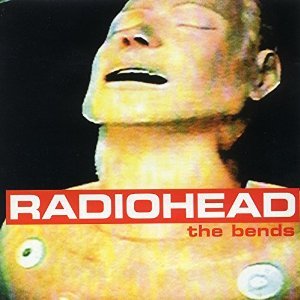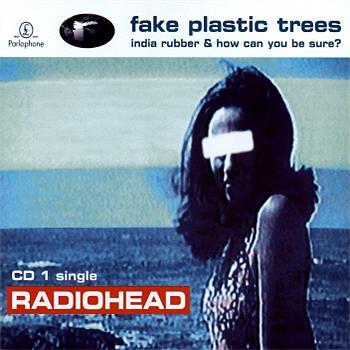The great leap forward. Some people prefer The Bends; some OK Computer; some Kid A. But why the need to choose? “In an interstellar blaaaast, I am back to save the universe.” Are we meant to take this as a jubilant expression or one of cynicism? In fact, this album’s overall mood shifts between both and is not the gloomy, sour rock album it’s been portrayed as (though Yorke and the documentary Meeting People is Easy certainly didn’t help fight that image.)
From start to finish, OK Computer sounds unique, but let me be clear. It’s not post-rock; it’s not some advancement of music as a whole; it’s not the key to translating alien languages. Yet, it has an amazing cohesiveness, a pressure, a set of images, a perfect collection of sounds to go with the music. Truly, OK Computer is one of the best albums ever recorded. A band truly pushing themsevles be it with the cut-and-paste drums of “Airbag” or the ethereal guitarwork of “Subterranean Homesick Alien” or the crushing sounds of “Climbing up the Walls.” Of course, those aren’t even the first songs people think of when this album comes up in discussion.
“Paranoid Android” shares DNA with Queen and Pink Floyd and Rush and Led Zeppelin and yes every huge rock band that’s managed to crank out an epic mess of sound and angst that somehow sounds like it all fell out of the band in one jam session. Shifting tempos, shifting keys, the drawly vocals that are of “no consequence at allll” leading to the bright, uplifting “what’s thaaaaaat?” How does a song like this come into being? It’s a lot like creating a diamond, I think: pressure, heat, and time. If you meet someone who’s never heard a Radiohead song before, “Paranoid Android” might not be the best place to start. It’s like this: “You’ve never heard Pink Floyd? Let me play you this song called ‘Echoes….’ and then the entirety of Dark Side of the Moon.” You’ll smash their brains to bits!
Of course, where to begin with Radiohead is always a tough question and one that I can’t answer here easily. But this album has it’s collection of beautiful moments. Think about the crystalline beauty of the guitars on “Subterranean Homesick Alien.” It’s the sound stars make. It’s the injection of alienation, as if we haven’t felt gamma blasting from the album already. Makes sense that “Exit Music [for a film]” follows, since the song compresses the angst into a single point of heat, light and mass, only to let it explode “And nowwwww, we are oneeeeee, in everlasting peeacceee.” We don’t even need to care this is a Romeo & Juliet song, but it certainly helps remind us that Yorke & co. Aren’t soulless, love starved monsters hellbent on depressing the shit out of us. Sure they accomplish that, but what better way to capture Shakespeare’s than to have the lovers smashed into a single point by the end of the song?
Well there’s no time to ponder that, friends, because “Let Down,” one of the most miserably beautiful (or beautifully miserable?) songs just sticks its insect mandibles into our flesh and carries us away. Remember those guitar phrases from “Vegetable” and “Anyone Can Play Guitar”? This is the same kind of element, though here it’s more an arpeggio than a phrase that drives the song. (And confirmation that Johnny Greenwood and Ed O’Brien likely have long alien fingers.) This song is both one that takes off and crashes, fitting both the lyrical and musical imagery of the album. Ultimately we’re crushed like a bug on the ground, yes, but has it ever sounded so wonderful? I dare you to listen to this on a warm spring day. Somehow you’ll end up depressed about how elated you feel, mostly because of Selway’s drums which keep jostling you forward, yelling, “Stay upright! Clap your hands! Clap your damn hands!”
Sigh.
But this enforced jubilation (if that’s even what we should call it) dies right in the maw of “Karma Police” one of the classic Radiohead song constructions. Be calm, be calm, be calm -- NOW PANIC! LOSE YOURSELF! LET THE STATIC ELECTRICITY FLOW THROUGH YOU!
Now listen to Thom Yorke futzing around with a text-to-speech program. I remember when I first heard this song, way way back, I had to laugh because I used the same program to make my computer say curse words. Yorke did something more profound with it, though I’m 100% sure (despite lack of evidence) he started out by typing in “bollocks” and “arsehole.”
Ok, “Electioneering.” If you are old and decrepit like me, you might know that the original version of this song had a slightly different composition (see 1996 La Cigale, Paris show). And if you spend any time in Radiohead forums, you will see “Electioneering” get jeered by fans who believe it’s not the right fit for the album. Well, that’s all fine. I don’t agree, but people need to have their say. Something about “Electioneering” reminds me of “Ignoreland” from R.E.M.’s acoustic masterpiece Automatic for the People. A politically-tinged song (in both cases) on an album of peaks and valleys. Alone they’re both solid tunes. On the album they certainly seem to stand out, but not because they are the best tunes. Still, “When I go forward, you go backward, and somewhere we shall meet” is a brilliant image, especially for Yorke’s sense of success-caused alienation. He’s said the song is less about politics but the nature of politicking the band was asked to do with labels and fans and managers and strangers.
If you have quality headphones this entire album shines, but none more brilliantly than “Climbing up the Walls,” wherein Yorke gives voice to insane spirits. The ping that pierces on the right speaker, the trembling sounds beneath the ping -- is that a bass string? A wavering piece of wood recorded and put through Pro Tools? Enjoy the rattle and clomp and the guitar mimicking Yorke’s voice (though a line later than his vocal melody). Listen to the synth before the manipulated strings tear at the left speaker. If Yorke ever wants to blow out his voice, he’ll do it with the climax of this song, the moment where he seems to be channeling Kurt Cobain, of all people, with that last ragged, haunting yawp of “Climing up the Waalllllllls yaaaaaaaaaaaa!”
How does an album keep going after that? It can’t go much further and this is where some debates about the length of this album come into play. Sure the clean, bright arpeggio of “No Surprises” might be the only thing to override the grit and doom of “Climbing” but can an album keep forcing us to turn inside out, revealing our frazzled nerves to the world as Yorke moans about numbness and the suburban nightmare of “a quiet life” and a “handshake of carbon monoxide.” It’s a good question. How much more can we take? We have to take more, though, and while “No Surprises” has the same kind of emotional launch that “Let Down” previously offered, there’s the sense that this is less a reprise and more being caught in the same musical ideas.
Don’t misunderstand me, this album offers me nothing bad. I hate no stitch of it. I lament no decision. I do not question the tracklisting, the length, the interconnected nature of the lyrics and music. But if this album feels too long to even a vocal minorty (and yes, it does feel long to enough people that I’m ranting here) then this is the reason “Electioneering” gets picked on even though “No Surprises,” “Lucky,” and “The Tourist” melt together into the end of the album and perhaps are the true areas to trim.
Seriously, though, doesn’t the album need “Lucky”? This profound inversion of depression and exuberance? Remember how “Airbag” warned everyone Yorke was back to save the universe? Here he’s feeling a tad less plucky, despite refusing to meet with “the head of state” because he “don’t have time for him.” While “it’s gonna be a glorious day” the fact that his “luck could change” reveals that the day is not glorious by default. Someone else needs to put him out of the aircrash and the lake. “I’m your superhero” but who saves a superhero? Where has that invicible feeling gone?
This thematic issue is the very reason the album needs to end with “The Tourist.” The slowing down of everything (“The Tourist” moves with a limp, especially when compared to these other closing songs the band’s recorded: “Blow Out,” “Street Spirit,” “Life in a Glass House,” and “Wolf at the Door”). “The Tourist” folds the album around, bringing us round to “Airbag” (because, “Hey man, slow down” that car). More importantly though is the urge for us to slow down. The inspiration for the song was, supposedly, the band seeing a tourist family rushing around Paris. They were seeing things but not enjoying things. In the world of OK Computer, time is out of our control. We’re crushed or in bottles (“Let Down”) we’re suffocated (“No Surprises”) no one believes us (“Subterranean…”) we’re in a plane crash, climbing up the walls, and tied to a stick. We’re one in everlasting peace, true,
The imagery of imprisonment threads throughout. How do you end an album with such oppressive feelings to remind the listener that there’s some glimmer of hope? You tell them to slow down. So: slow down.






